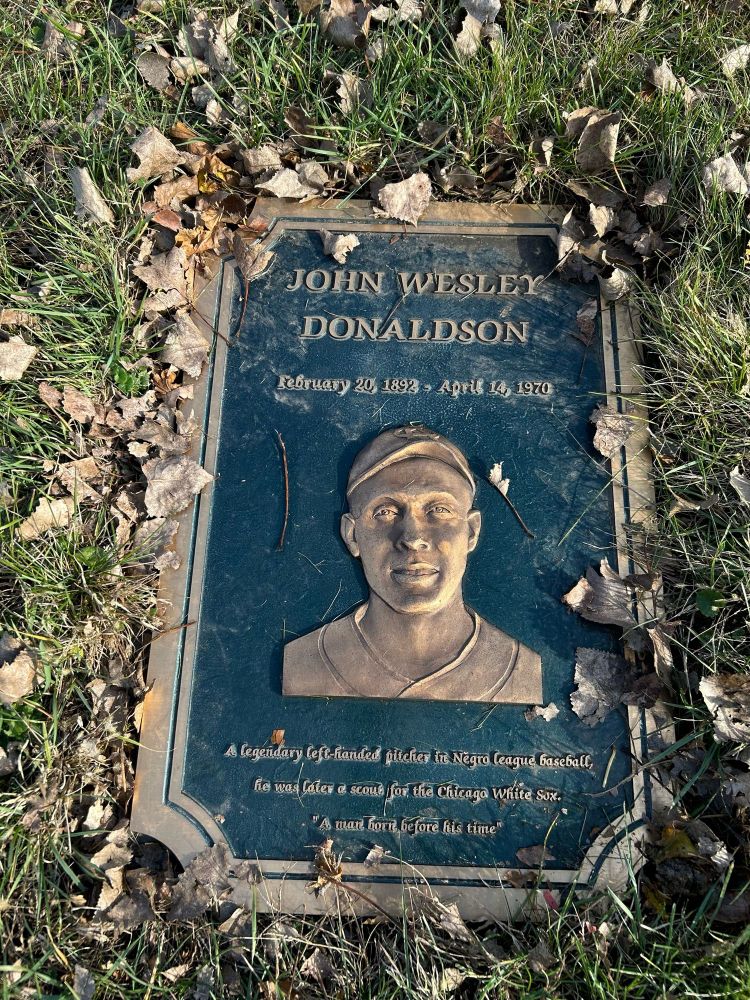
Many thanks to my friend Deron Schreck for going out today and taking a photo of John Donaldson’s grave for this post.
What ballot he’s on: 2025 Classic Baseball Era Committee ballot, to be considered Dec. 8 at the winter meetings
Previous known times he’s been a Veterans Committee or Era Committee candidate: 1 (2022)
Highest showing as a veteran candidate: 50% from the Early Baseball Era Committee for the 2022 election
Number of times he appeared on a Baseball Writers Association of America ballot for the Hall of Fame: 0
Thoughts on his candidacy this year: I like to think I was an early adopter on John Donaldson being underrated historically.
I wrote a post for this website back in 2010 referring to Donaldson as a great pitcher who people had likely never heard of. It was really interesting researching that article, learning about how Donaldson had amassed 363 wins that were known at that point to researchers between Negro League and semi-pro play from 1908 to 1940. It’s an incredible story and one worth preserving in one form or another in baseball’s annals.
Thing is, a lot has changed since 2010 regarding Negro League research. Landmark statistical research has helped get at least partial numbers of many Black greats onto Baseball-Reference.com. And, at least in Donaldson’s case, the numbers are pretty underwhelming. They show that Donaldson went 6-9 with a 4.14 ERA and 0.7 WAR for the Kansas City Monarchs between 1920 and 1921.
Does this mean that Donaldson’s legend is destroyed? Not necessarily. These are numbers for two known seasons out of a three-decade run. They represent a fraction of his productivity. There’s still so much about Donaldson’s story that we don’t know, just as it is with many other Black greats.
What I will say, though, is that there are a number of other Black players not in the Hall of Fame whose known numbers make me think they might deserve a spot on this ballot ahead of Donaldson.
There’s his teammate and shortstop Dobie Moore, whose 162-game averages are a beefy 8.7 WAR, with 12 homers, 138 RBIs and a .350/.393/.524 slash line. George Scales is at a .320/.424/.509 slash and is up to 697 known hits. The fact that his career spanned 1921 to 1946 tells me there might be a whole lot more hits. Then there’s Rap Dixon – who, like Donaldson, has some very passionate supporters for his Hall of Fame case – and projects as one of the best hitters of the 1920s and ‘30s with 162-game averages of 22 homers, 132 RBIs and a .336/.415/.554 slash. And there are probably many more Negro League greats who could be noted here.
This isn’t to take too much away from Donaldson. I think I’d just prefer to consider candidates at this point whose greatness is being borne out by the latest statistical research.
Do I think Donaldson belongs on this ballot? I want to preface this by saying that to me Donaldson belongs on a larger ballot. But on this particular eight-man ballot, there are probably many other candidates I’d prefer before him.
Do I think Donaldson gets into the Hall of Fame this year? Hard to say. Donaldson clearly had some momentum his last time out, missing by only four votes. The fact that that committee enshrined another early Black great, Bud Fowler, tells me Donaldson’s lack of stats on Baseball-Reference.com might not derail his candidacy this year. Still, I wouldn’t count on him going in.